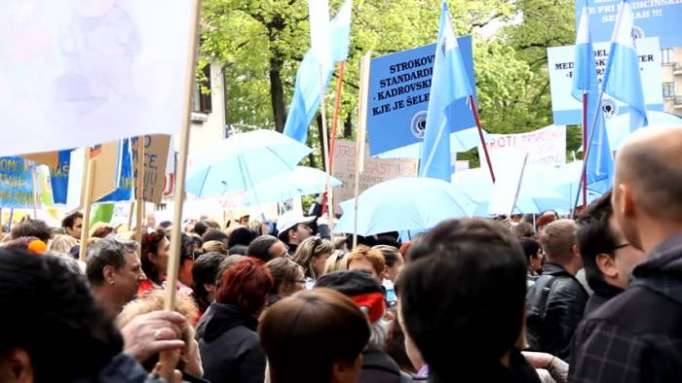Several thousand people are expected to protest for more pay in front of the government building in the center of Ljubljana later on Wednesday, trade unions said.
“Although this is the fifth year of economic growth some wage restrictions imposed in 2012 have not been lifted yet. It is time to scrap all restrictions and increase wages,” said Jakob Pocivavsek, the unions’ head of strike coordination.
He told Reuters public sector wages should rise by 16 to 20 percent over a period of time due to be determined in negotiations with the government.
Slovenia curbed public sector wage growth in 2012 amid a severe financial crisis which ended with a bank overhaul in 2013 that enabled the country to narrowly avoid an international bailout. It returned to economic growth a year later.
“We are trying to share the effects of economic growth as fairly as possible ... and only in the past two years the public sector wage bill was increased by 10.7 percent while the average wage rose by seven percent,” Prime Minister Miro Cerar told parliament on Monday.
“That is why it is really hard to understand these extreme pressures of trade unions with enormous demands for more money,” he said, adding “we cannot share what we do not have”.
The government has said unions’ demands have reached almost one billion euros ($1.23 billion) and are unacceptable as they are not justified by productivity and economic growth and would threaten the planned fiscal consolidation.
“If we increase the cost of labor in the public sector by one billion euros, we break macroeconomic balances. As a society we cannot survive that,” Public Administration Minister Boris Koprivnikar said.
Policemen, nurses and teachers plan separate strikes in February unless the government agrees to raise wages by then.
Analysts said unions have increased their demands in recent months because they hope the center-left government may be more generous ahead of a parliamentary election due in June.
Slovenia, a 40-billion-euro economy, expects economic expansion of 3.9 percent this year versus 4.4 percent in 2017, boosted by higher exports and investments.
The government plans to run a budget surplus of 0.4 percent of GDP this year versus a deficit of 0.8 percent in 2017.
REUTERS
More about: #Slovenia
















































